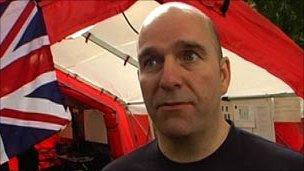New Zealand quake: UK search-and-rescue team optimistic
- Published

Paul Burnham said morale was still high in the 61-strong UK rescue team
Hopes of finding more survivors from the Christchurch earthquake are diminishing as more bodies are found by rescuers, including specialists who have rushed from the UK and elsewhere to help.
Theirs is a grisly task but members of the 61-strong UK team remain upbeat and believe that someone somewhere is still alive beneath the endless piles of rubble and broken buildings in New Zealand's second most populous city.
The British contingent is part of an international response to Tuesday's magnitude 6.3 quake, and it joins other experts from Japan, Australia and the US.
"Morale is high and we're still in the rescue phase. We're well-prepared and want to crack on with the job," Paul Burnham from the West Midlands Fire Service told the ДѓЯѓДЋУН in Christchurch.
The team comprises urban search-and-rescue specialists drawn from more than a dozen British fire brigades, including Hampshire, Leicestershire, Wales, Grampian and Essex.
'Perilous'
The British High Commissioner to New Zealand, Vicki Treadell, said it was important to show solidarity with a Commonwealth cousin in desperate need.
"With New Zealand and Britain being such close friends this is an opportunity to support and assist each other at this time of crisis," she said.
The experts from the UK have brought more than 10 tonnes of equipment halfway around the world, as well as supplies of food, water and tents that will allow them to be self-sufficient for up to a fortnight.
Heavy-duty cutting and lifting apparatus gives them the capacity to break through and remove reinforced concrete, while acoustic listening devices and cameras can take the search deep into previously inaccessible parts of collapsed structures.
Speaking to the ДѓЯѓДЋУН in the centre of Christchurch, Terry Jewell from the Essex International Search and Rescue Team said his unit had to move carefully.
"As you've probably seen, that building behind us, which is a very high multi-story building, the stairs have collapsed so we're just having to adapt.
Terry Jewell, a rescue worker from Essex, said the search was being carried out extremely carefully
"We're having to come down from above - make our way down rather than make our way up, with the collapsed staircases that are in a lot of them," Mr Jewell explained.
Working in rolling 12-hour shifts, the British have been helping to sift through houses in quake-hit suburbs, as well as comb through the wreckage of the Pyne Gould Guinness Building, one of Christchurch's best-known office blocks.
It has been reduced to a horrible mass of contorted steel and concrete.
Negotiating the rubble and listening for the faintest hint of life are arduous responsibilities, while scouring the dark and claustrophobic bowels of shattered buildings is, of course, perilous.
Recent rain has dislodged loose masonry and a rash of minor tremors has made unstable structures even more precarious.
Mental pressure
"Obviously we're getting aftershocks so we've got to be prepared for those," explained Phil Parker, an emergency volunteer with the New Zealand rescue services.
"There's always that danger of the buildings coming down on us. The teams are trained how to evacuate the building. But it is high risk, there's no question on that."
Officially, this remains a rescue not a recovery mission but the grim reality is that it is more than three days since anyone was found alive in the debris and time is running out.
Despite so many fruitless hours, rescuers remain determined and optimistic, although Mr Parker says the mental pressure on them is beginning to show.
Paul Bickerton said experience from countries like Indonesia and Iran helped rescue workers
"There is a strain on everybody. We've been talking to people in the last couple of days that have friends still missing, so you've got to deal with that. You do get affected to a certain degree.
"We've got good counselling services for all the affected teams once we come off site, and we also stick togetherтІand talk about it during the night, so that you get that stress level out," said Mr Parker.
Like many of their international colleagues, members of the British response have worked under testing circumstances in other quake zones including Haiti, Iran, Indonesia, Turkey and Macedonia.
Paul Bickerton, from the Cheshire Fire and Rescue Service, said those experiences had fortified them for the challenges they face in New Zealand.
"The last one that I've been to was Sumatra (in Indonesia), and that was very sporadic in terms of the building collapses, [so] very similar to how it is here," he said.
The emergency effort has not stopped for a moment since the earthquake roared through Christchurch on Tuesday.
The goal is simple; to find survivors. This frightened and beleaguered city deserves a miracle; a symbol of hope that despite nature's violence life can prevail in the most wretched of circumstances.
- Published26 February 2011
- Published25 February 2011
- Published26 February 2011
- Published25 February 2011